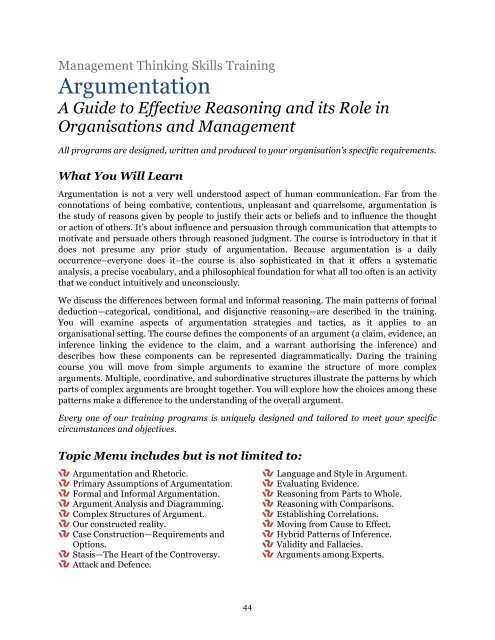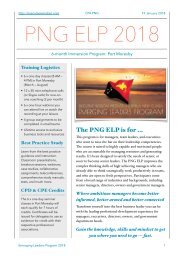Management Resources Guide
the 2018 Management Resources Guide details comprehensive information on the professional services provided by Executive Wisdom Consulting Group.
the 2018 Management Resources Guide details comprehensive information on the professional services provided by Executive Wisdom Consulting Group.
You also want an ePaper? Increase the reach of your titles
YUMPU automatically turns print PDFs into web optimized ePapers that Google loves.
<strong>Management</strong> Thinking Skills Training<br />
Argumentation<br />
A <strong>Guide</strong> to Effective Reasoning and its Role in<br />
Organisations and <strong>Management</strong><br />
All programs are designed, written and produced to your organisation’s specific requirements.<br />
What You Will Learn<br />
Argumentation is not a very well understood aspect of human communication. Far from the<br />
connotations of being combative, contentious, unpleasant and quarrelsome, argumentation is<br />
the study of reasons given by people to justify their acts or beliefs and to influence the thought<br />
or action of others. It’s about influence and persuasion through communication that attempts to<br />
motivate and persuade others through reasoned judgment. The course is introductory in that it<br />
does not presume any prior study of argumentation. Because argumentation is a daily<br />
occurrence–everyone does it–the course is also sophisticated in that it offers a systematic<br />
analysis, a precise vocabulary, and a philosophical foundation for what all too often is an activity<br />
that we conduct intuitively and unconsciously.<br />
We discuss the differences between formal and informal reasoning. The main patterns of formal<br />
deduction—categorical, conditional, and disjunctive reasoning—are described in the training.<br />
You will examine aspects of argumentation strategies and tactics, as it applies to an<br />
organisational setting. The course defines the components of an argument (a claim, evidence, an<br />
inference linking the evidence to the claim, and a warrant authorising the inference) and<br />
describes how these components can be represented diagrammatically. During the training<br />
course you will move from simple arguments to examine the structure of more complex<br />
arguments. Multiple, coordinative, and subordinative structures illustrate the patterns by which<br />
parts of complex arguments are brought together. You will explore how the choices among these<br />
patterns make a difference to the understanding of the overall argument.<br />
Every one of our training programs is uniquely designed and tailored to meet your specific<br />
circumstances and objectives.<br />
Topic Menu includes but is not limited to:<br />
Argumentation and Rhetoric.<br />
Primary Assumptions of Argumentation.<br />
Formal and Informal Argumentation.<br />
Argument Analysis and Diagramming.<br />
Complex Structures of Argument.<br />
Our constructed reality.<br />
Case Construction—Requirements and<br />
Options.<br />
Stasis—The Heart of the Controversy.<br />
Attack and Defence.<br />
Language and Style in Argument.<br />
Evaluating Evidence.<br />
Reasoning from Parts to Whole.<br />
Reasoning with Comparisons.<br />
Establishing Correlations.<br />
Moving from Cause to Effect.<br />
Hybrid Patterns of Inference.<br />
Validity and Fallacies.<br />
Arguments among Experts.<br />
44



